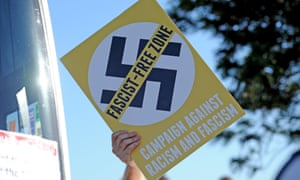White Supremacist Insurgency
Here is an article from the Guardian. I felt inspiration in the word ‘insurgency’ as it links to terror-ism and extreme-ism. This is when one’s beliefs are absolute and right. In a multicultural country it is wise to be open to diverse views who may not believe in the supremacy of skin colour or who may in turn have fled other forms of oppression.
This moment is revealing that thee belief system are still present in this country. It appears they are being encouraged. That is to be questioned given representation in a democracy.
There’s no excuse for justifying the racist attitudes that plague Australia
We must name white supremacist beliefs, whether they come from the fringes or the Senate

2018 had a lot of moments of hope despite the rising tones of white supremacy in Australia and abroad.
The Liberal party voted in favour of Pauline Hanson’s “It’s OK to be white” motion (and no, it wasn’t an “administrative error”), but quickly backtracked when media started to point out the connections of that slogan to white supremacist groups.
Just that in itself was significant in many ways. Australia doesn’t really like to acknowledge our white supremacy outside of Nazis, skinheads or the KKK, and even then there’s still plenty of media people who will call them “far-right activists” or even just “concerned citizens”. So to acknowledge that our governing party voted in favour of a white supremacist slogan was a pretty big deal for those of us who watch how Australian media all too readily ignore overtones of white supremacy.
We seem to forget in Australia that not so long ago white supremacy wasn’t framed as a fringe belief – it is what modern Australia was founded on. The White Australia policy was in effect from 1901 to 1973, although it had slowly been dismantled for years before it was finally abolished. However, the white supremacist mindset that led to that policy (and before then justified the dispossession, exploitation, exclusion, segregation and oppression of Indigenous people) has never really left the national discourse or political landscape. It simply moved from overt statements of white superiority to more covert dog whistling about concerns of “being swamped”, or of “immigrants’ inability to assimilate”, or on less subtle language around the superiority of “western civilisation”.
The recent resurgence of the more readily recognisable white supremacists and the realisation of how easily they infiltrated the Young Nationals last year, or an Australian senator praising the White Australia policy, calling for a “Muslim ban”, and making reference to the “final solution” in his maiden speech was a wake up call to some. These events made many realise that the lines between the disreputable white supremacists of movies such as Romper Stomper and the respectable white supremacists who founded this nation and still readily find their way into politics and media are more blurred than many Australians would have liked to acknowledge.
While all this has been going on, quietly chipping away at the white supremacist foundation on which Australia is built – the myth of terra nullius and all of the associate beliefs in Indigenous inferiority – have been books such as Dark Emu by Bruce Pascoe, and the work of Indigenous scientists, mathematicians and astronomers, who have been detailing the amazing feats of Indigenous peoples and cultures predating any other groups in human history. Concepts that were once universally decried by white society as non-existent, even oxymoronic, are now being thrust into the public psyche. There has even been some significant inroads in providing support for teachers to inform their students about these important achievements to help ensure that the next generation of Australians do not build their world view solely on the white supremacist myths of the past.
Australia likes to paint itself as light years away from the rise of fascism, but recent criticism of people drawing comparisons between our current treatment of refugees and the rise of fascism in Nazi Germany drew a strong rebuke from the Auschwitz Memorial reminding us that the past can and does repeat itself if people are not vigilant.
Auschwitz Memorial (@AuschwitzMuseum)
If you see human suffering & you think this is not so important because “it’s not yet Auschwitz”… ⁰⁰Then, think again.⁰
We commemorate and educate about the tragic history of Auschwitz as we believe it should inspire people today to build a better & a more responsible world.
So, in 2019 there are even less excuses for justifying the dehumanising and racist attitudes that plague Australia. There is no reason not to name white supremacist beliefs as such, whether they are coming from the fringes or from the Senate.
The tools are all there for us to finally engage in historic truth-telling and fully understand how the nation we have today has been shaped and informed by the Australia of yesteryear. We can finally understand that colonisation in Australia was not a single act 200 years ago, but an ongoing process that continues to disempower and disenfranchise many who live within it. Not just Indigenous people, but all those who see the environmental, social, and cultural damage it has and continues to cause. All those who see that access to the “best of western civilisation” does not eventuate from being given the worst of it.
The future of Australia is in our hands, and I hope in 2019 even more people step up to the challenge to create an Australia deserving of a national celebration, even if it can’t be on 26 January.
• Luke Pearson is the founder and director of @IndigenousX and IndigenousX
• Guardian Australia is proud to partner with IndigenousX to showcase the diversity of Indigenous peoples and opinions from around the country.
• Comments are premoderated to ensure the discussion is about topics that have been addressed in this article.